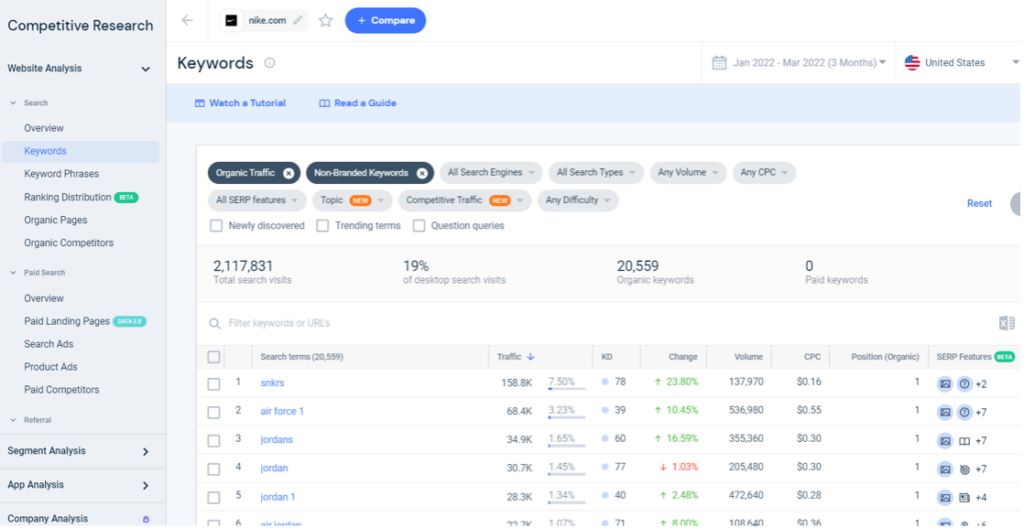Having your website pages rank well in Google’s organic search results can be extremely valuable for driving traffic to your site. As Google tweaks their search engine algorithm constantly, here are some strategies to improve your organic search engine rankings.
1. Compile a List of Keywords
You cannot expect to rank highly in Google for every keyword related to your industry. Instead, determine which keywords you want to appear near the top of organic searches. Compiling a list of relevant keywords will allow you to outrank potential competitors and increase your site traffic. Keywords should be reflective of your products and services and can be further researched with a tool like SimilarWeb or Google’s Keyword Planner. Search for keywords with high traffic potential and low to medium competition, as they have the most traffic potential and are easier to rank for.

Tools like SimilarWeb can help you see search volume and competition for your desired keywords
2. Organic Rankings Are Won by Good Content
Writing quality content that is easily shareable and links back to your site is the most efficient and accessible method of improving SEO rankings. Google’s rankings algorithm rewards content virality heavily, and good content stands the best chance of going viral. Blogs, articles, and press releases are all forms of content that can drive traffic back to your site and improve your SEO ranking.
3. Optimize your page content for keywords and related variations
To rank for a keyword, you need to use it in your page titles, headlines, and body text. You should include important keywords early, since early placement can indicate relevance and be picked up by Google sooner. It is important to use your focus keywords throughout your copy, but not at the expense of good writing. It is now part of Google’s algorithm to penalize websites that use excessive keywords in a manner that interferes with the reading experience. The best way to avoid being penalized for keyword jamming is to read your copy aloud. If your keyword use sounds unnatural, you may be flagged for it. This can be corrected by replacing the focus keyword with secondary keywords you want the blog to rank for.

4. Optimize Your Page Titles
The <title> HTML tag defines a web page’s title and is meant to be a concise description of that page’s content. A hyperlinked title appears at the top of Google’s organic search results, and it appears on most web browsers for the page itself as well as in tabs. In Google’s algorithm, this is considered an essential SEO factor. Make sure to keep your page titles under 70 characters, as anything longer will be cut off in Google’s organic search results. Keywords should be included in the title, preferably at the beginning to further increase relevance and ranking. To increase brand awareness, include your company at the end if you have extra space.
5. Write Meta Descriptions that Drive Clicks
The <meta name = description content= > HTML tag is meant to be a concise explanation of a web page’s content. Google displays your meta description beneath the page title in their organic results. Meta descriptions aren’t nearly as important to Google’s ranking algorithm as page titles, instead, their function is to drive clicks from users. People read descriptions as a preview of your page and use it to determine if your content is worth visiting. Therefore, you need to provide a clear value proposition about what they will gain by visiting your page and reading your content. Consider using words that inspire action like “learn more,” “find out,” or “discover” to increase clicks and interactions.
